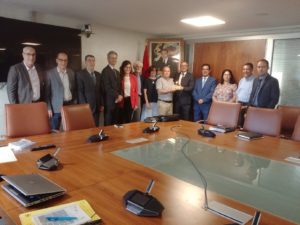After much preparation, our partner country Morocco joined the Metre Convention this year and therefore became one of the 60 Member States of the Bureau International des Poids et Mésures (BIPM) as of 24 May 2019. The Moroccan metrology system’s journey to this milestone was supported by the long-standing cooperation of PTB with Moroccan partner institutions within the regional project “Promotion of metrology in Maghreb to strengthen international trade”. The project is currently in its third phase of implementation.

The Director of the LPEE-LNM and the Director of consumer protection, market surveillance and quality (Directeur de la Protection du consommateur, de la Surveillance du Marché et de la Qualité [DPCSMQ], Ministère de l’Industrie, du Commerce, de l’Investissement et de l’Economie Numérique) celebrate membership and are surrounded by DPCSMQ staff, university representatives and the PTB team.
Since the ratification of the international Metre Convention, more and more countries have signed the Convention and have thus become members of the BIPM – as of now, there are 60 Member States and 42 Associated States.
New and exciting opportunities are opening up for the Moroccan metrology system now that it is a member. Our partners at the national metrology institute LPEE-LNM (Laboratoire Public d’Essais et d’Etudes – Laboratoire National de Métrologie) signed the multilateral CIPM-MRA agreement on 15 July at the BIPM in Paris. This allows the institute to have its own Calibration and Measurement Capabilities (CMCs) recognized at the international level. This is a further important step for the national metrology institute because it will be able to prove the equivalency of its services, for example, of its calibrations, with international standards. Congratulations from us for achieving this milestone!








